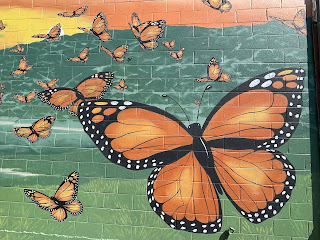Politics is one of those areas that I find fascinating... but would never consider personally for a profession! We want the best people to step forward to be our leaders... but so much time, energy, and money is spent tearing down these people. Such a paradox!
I've noticed over the last few decades how varying beliefs and values have divided us: we sometimes can't be in the same room with people who think differently!
Just look at our "social" media: it is full of memes that repeat slogans and ideologies that separate us.
 |
| How do you handle differing views? (Photo credit: Facebook download) |
Language helps us convey abstract thoughts to another
person. We use words to describe what we are
thinking, feeling, seeing, and doing. We may not always select the right words. That is why patience
and curiosity are important.
I don't want to use this forum to highlight one political party over another, but a recent example of our current political discourse shows how words shift from being adjectives to becoming labels: that is, describing someone's words and actions as Weird to then calling that person a Weirdo.
Words have power: they influence our way of thinking; they sometimes call us to action.
 |
| Where are you generous in spirit? (Photo credit: Kindred Spirits, Cork, Ireland) |
Have you heard this story about the American Indian Choctaw tribe: in 1847, they heard about the Irish potato famine and collected $200 to send to the starving families in Ireland. The Choctaw were not rich. In fact, they too were suffering hardships. Words describing hardships challenged these people to support others.
The Irish created the Kindred Spirits sculpture in County Cork to commemorate this act of selfless giving: nine 20-foot tall stainless-steel feathers arranged in the shape of a bowl of food. The Choctaw and Irish are forever joined.
Words moved people to action: humanity came together to understand Suffering Shared.
 |
| When do words set you free? (Photo: Storefront Design, Carlsbad, CA - Larry Gardepie) |
Shifting from adjectives to labels is quick: we move from descriptors of what we are experiencing to opinions and conclusions about others. This is the movement from adjectives to labels that I am describing. We all do this!
I believe that language and words are meant to connect and build, to share meaning and understanding... and to explore similarities and differences. I don't believe they are intended to hurt... but sometimes they do!
The challenge this election cycle is to listen to our words. Like the Choctaw, how can we hear the suffering of another and be moved to support?
May our words this week help to free ourselves and others!
 |
| Larry Gardepie (click on link for website) |












